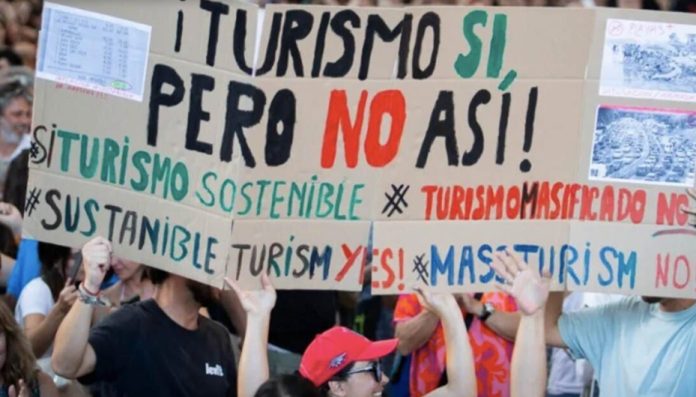A group of several hundred associations in Spain, known as Ecologistas, marched through the city of El Puerto de Santa Maria to denounce “uncontrolled mass tourism,” chanting “Our city is not for sale!”
Thousands of protesters marched in Barcelona on July 6 to denounce the excess of tourists, and on July 22 there was another large demonstration against mass tourism in Mallorca, an island known for its beaches, protected rivers, limestone mountains and archaeological sites.
Spain welcomed an additional 24 million tourists in the first quarter of 2024 compared to the same period of the previous year, a year-on-year increase of 14.5 per cent. The country has already recorded a record number of international visitors in 2023. The tourism boom is driving up prices in shops as well as housing costs, which locals say is making it difficult to access accommodation.
Popular destinations in Spain such as Barcelona and Seville, as well as Venice in Italy, Etretat in France, Athens and Paros in Greece all experienced a downturn in tourism during the years when COVID-19 spread. Now tourism in Europe and elsewhere is picking up again, with people being inspired by cheap airfares or adverts for certain sites on social media.
This sector represents an undeniable source of revenue for the countries concerned. In Spain, for example, rising visitor numbers and prices have led to a 22.6 per cent increase in tourist spending in the first quarter of 2024, exceeding €31.5 billion, according to the National Institute of Statistics. However, uncontrolled mass tourism is increasingly becoming a scourge on the local population.
Unbearable place to live
Spain’s most visited city, Barcelona, welcomes around 12 million people a year, many of whom arrive on cruise ships. The growing number of tourists each year has put pressure on health services, waste management, water supply and housing – to the detriment of residents.
In early July, some 3,000 people marched through the city of Gaudi, chanting “Tourists, go home!” and pelting people they thought were tourists with water pistols.
In response, authorities announced that they would ban renting out flats to tourists by 2028; a total of 10,000 flats will lose their licence for short-term rentals on platforms such as Airbnb. The city’s leftist mayor Jaume Collboni also announced plans to raise the tourist tax for cruise ship passengers who visit the city for less than 12 hours.
Locals in Andalusia, another Spanish destination popular with foreign tourists, have also voiced their displeasure with mass tourism. Francisco Martinez, president of the Ancha la Feria neighbourhood association, told Spanish publication El País about the influx of tourists on the terraces in the historic city centre:
I dream of retiring, renting out my apartment and leaving Seville. The city centre might be good for drinking a beer, but it has become an aggressive and unbearable place to live.
Seville’s conservative mayor Jose Luis Sanz announced in February that plans were underway to introduce an entrance fee to Plaza de España, a major attraction particularly popular with tourists visiting the Andalusian capital. He wrote on X:
We are planning to close the Plaza de España and charge tourists to finance its conservation and ensure its safety.
He accompanied the news with a video showing broken tiles and balustrades, as well as street vendors camped out in alcoves and sitting on staircases.
The problem has spread far beyond Spain
Venice authorities have launched a pilot programme that charges tourists a €5 entrance fee to stroll along the famous canals on busy days. Most residents found this measure insufficient; they would prefer to limit the number of visitors per day in order to successfully protect the city. Peru, for example, adopted a measure limiting access to Machu Picchu to 2,500 visitors per day.
Other European cities, such as Amsterdam in the Netherlands, have decided to raise the tourist tax. The Dutch capital has confirmed that it is raising the tourist tax on hotel rooms to 12.5 per cent of the room rate for all visitors. The city, which is actively working to prevent tourism that reduces the quality of life of its residents, has also tightened its rules to curb cannabis-related tourism and now prohibits the construction of new hotels.
